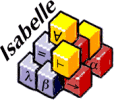Getting started

For getting started with Isabelle quickly, we recommend the Tutorial on Isabelle/HOL (published by Springer Verlag as LNCS 2283) and the course material.
Mailing list and FAQ
You may use the mailing list ![{isabelle-users} AT [cl.cam.ac.uk]](isabelle-users_cl_cam_ac_uk.png) and its archive to discuss problems and results. Why not subscribe?
and its archive to discuss problems and results. Why not subscribe?
Please consult the FAQ for answers to frequent problems.
Tutorials, Manuals and Library Theories for Isabelle2008
Learning and using Isabelle
- Tutorial on Isabelle/HOL
- Tutorial on Isar
- Tutorial on Locales
- Tutorial on Type Classes
- Tutorial on Function Definitions
- Tutorial on Code Generation
- LaTeX sugar for proof documents
- (Co)Inductive Definitions in ZF
Reference Manuals
- The Isabelle/Isar Reference Manual
- The Isabelle/Isar Implementation Manual
- The Isabelle System Manual
- The Isabelle Reference Manual
- Isabelle's Logics: overview and misc logics
- Isabelle's Logics: HOL
- Isabelle's Logics: FOL and ZF
Theory libraries
- Higher-Order Logic
-
- HOL (Higher-Order Logic) is a version of classical higher-order logic resembling that of the HOL System.
- HOLCF (Higher-Order Logic of Computable Functions) adds Scott's Logic for Computable Functions (domain theory) to HOL.
- First-Order Logic
-
- FOL (Many-sorted First-Order Logic) provides basic classical and intuitionistic first-order logic. It is polymorphic.
- ZF (Set Theory) offers a formulation of Zermelo-Fraenkel set theory on top of FOL.
- CCL (Classical Computational Logic)
- LCF (Logic of Computable Functions)
- FOLP (FOL with Proof Terms)
- Miscellaneous
-
- Sequents (first-order, modal and linear logics)
- CTT (Constructive Type Theory) is an extensional version of Martin-Löf's Type Theory.
- Cube (The Lambda Cube)
Release notes
Course Material and Exercises
The course material page makes slides, demos, and exercises of a growing number of Isabelle courses available. It is meant as a resource for people who would like to learn Isabelle as well as for those who would like to teach it.

